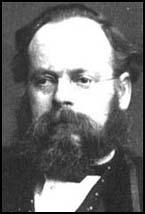Samuel Plimsoll

Samuel Plimsoll, the son of Thomas Plimsoll and Priscilla Willing, was born in Bristol on 10th February, 1824. Plimsoll became involved in shipping coal to London and soon became one of Britain's leading experts on trading in this community.
By 1862 Plimsoll had written two books on the subject, The Export Coal Trade of England and The Inland Coal Trade. His research into the coal trade made him aware of the dangers faced by sailors. He was particularly concerned with the negligence of some shipowners and the indifference of government to the issue of marine safety.
While working in London Plimsoll lived in one of the model lodging houses for working men established by Lord Shaftesbury. Aware of the role that Shaftesbury had played in persuading Parliament to pass protective legislation, Plimsoll decided to try and become a member of the House of Commons.
Plimsoll joined the Liberal Party and in the 1868 General Election, Plimsoll was elected as MP for Derby. He immediately began to campaign for government legislation to protect seamen. To support his case he published Our Seamen (1873), a book that provided documentary evidence about the scale of the problem. This included information that nearly 1,000 sailors a year were being drowned on ships around British shores. As part of his campaign, a copy of the book was given to every member of the House of Commons.
Plimsoll was particularly critical of the 1871 Merchant Shipping Act. As a result of this legislation seamen were obliged, subject to imprisonment and fine, to go to sea and complete a voyage once they had signed a contract. This made it difficult for sailors to leave a ship once they realised it was unseaworthy. In March 1873, The Times joined Plimsoll's campaign by printing a story about fifteen seamen who had been imprisoned for three months after they refused to go on board the ship Peru. When the ship finally left Cardiff with a new crew, it sunk in the Bay of Biscay and three men were drowned.
Ship-owners had powerful supporters in the House of Commons and it was argued by them that the government should not pass legislation that restricted the freedom of employers to run their companies. Gradually, other politicians, such as Lord Shaftesbury, became involved in Plimsoll's campaign. In 1875 Benjamin Disraeli, the Conservative prime minister, changed his mind on the issue and in 1875 gave his support to an Unseaworthy Vessels Bill.
The following year Samuel Plimsoll managed to persuade Parliament to amend the 1871 Merchant Shipping Act. This provided for the marking of a line on a ship's sides which would disappear below the water line if the ship was overloaded. A further amendment in 1877 imposed a limit on the weight of cargo which vessels were permitted to carry and created rules governing the engagement of seamen and their accommodation on board ship.
Plimsoll retired from the House of Commons in 1880. Although no longer in Parliament he continued to campaign for reform and in 1890 published Cattleships, a book that exposed the cruelties and dangers of cattle-shipping.
Samuel Plimsoll died in 1898.
